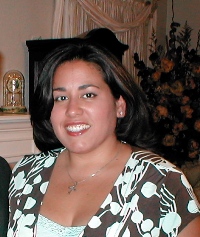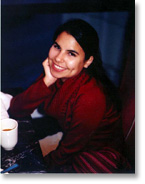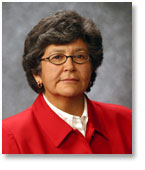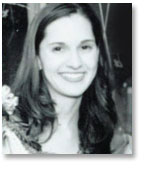Dissertation Fellows
 2008-2009
2008-2009
Evelyn Boria-Rivera
University of Notre Dame
English Department
Boria-Rivera is a Ph.D Candidate in the English Department and Institute for Latino Studies at the University of Notre Dame. Her dissertation considers the role of literary representations of the maternal in the development of late XX century American literature by Latinas and focuses on the historical conciousness of policed maternity, particularly in relation to controlled fertility during the period of the Cold War.Boria-Rivera's project seeks to understand why important histories of maternal repression are almost absent from literary texts that often try to recover and retell the history of major waves of Latin American immigration to the US at the period of the Cold War.
 2007-2008
2007-2008
Christina Mendoza
University of Michigan
Sociology Department
Christina Mendoza is a Ph.D Candidate in the department of Sociology at the University of Michigan in Ann Arbor. Her dissertation explores the temporary migration of Mexican women workers who reside in Mexican border cities and across international borders daily to work as domestics in American homes. Based on in-depth interviews and participant observation with domestic workers and employers, she analyzes the multiple factors in both Mexico and the United States that lead to this female "migration" at the border, the influence of gender in this cross-border movement, and the interlocking systems of gender, social class, and race that shape experiences of Mexicana domestic and Chicana employers in the Texas-Mexico border.
 2006-2007
2006-2007
Lourdes Alberto
Rice University
English Department
Alberto’s dissertation “The Politics of Articulation: Chicana, Latina, and Indigenous Cultural Productions and U.S. Consumerism, 1973-2001” examines cultural productions of and by Chicana, Latina, and indigenous Mexican women in popular culture to theorize the ways women are deployed to negotiate anxieties around citizenship, inter-ethnic difference and consumerism at the end of the millennium. Taking popular culture as the central site in which to examine the construction of ethnic identity, Alberto interrogates the indigenous-Chicana-consumer nexus to assert that at the intersection of Chicana cultural productions and Latina consumer culture, indigenous subjects are simultaneously recast as authentic and yet invisible. This project is the first to vigorously interrogate indigenous identity in the U.S. and the importance of consumer culture in shaping contemporary Mexican American identity.
2005-2006
Melissa Moreno
University of Utah
Department of Education, Culture & Society
Moreno is a Ph.D Candidate in the Education, Culture & Society Program at the University of Utah. Moreno's dissertation, grounded in ethnographic research, focuses on formations of cultural citizenship practices and identity among young adults who self-identify with U.S.-Mexican communities. By drawing on a combination of post-structural and social cultural theories, she studies how young adults learn to constitute a cultural sense of citizenship in multiple social fields (i.e., family, community, and paid work). In Spring 2005, Moreno will teach an undergraduate course through the Chicana/o Studies Program “Cultural Citizenship and U.S. Mexican Communities.”
Current: Moreno is currently a Dissertation Fellow in the Department of International and Multicultural Education at the University of San Francisco. She has published in Qualitative Studies in Education, Journal of Latinos and Education and has a forthcoming article in How and Why Gloria Evangelina Anzaldua’s Life and Work Transformed our Own.
 2004-2005
2004-2005
Mary DeLaRosa
University of Utah
Department of Education, Culture & Society
DeLaRosa is a Ph.D Candidate in the Education, Culture & Society Program at the University of Utah. Her dissertation provides an institutional profile of Chicana/Latina High School students enrolled in Spanish for Native Speakers Classes and the influence of language use on identity constructions. By focusing on the factors that influence identity, her work contributes to the theoretical discussions about Latina/o identities, school performance and native language use in academic settings. In Spring 2005, while in-residence at UC Davis, DeLaRosa taught her own seminar, “Chicanas/os In Education.” DeLaRosa was a vital contributor to the establishment of the UC Davis MALCS campus chapter, and she also organized, guided and prepared a panel of undergraduates and graduate students to present their work at the annual MALCS Summer Institute held at UC Berkeley, in August 2005.
 2003-2004
2003-2004
Dolores Ines Casillas
University of Michigan
Department of American Cultures
Casillas is currently a Ph.D Candidate in the Program in American Culture at the University of Michigan, Ann Arbor. While in residence at UC Davis Casillas taught her own undergraduate seminar, “Latinidad: The History of Media Making of US Latinos,” through Chicana/o Studies. Casillas also organized “Chicana/Latina Graduate/Undergraduate Roundtable” on May 24, 2004. The workshop encouraged undergraduate women to pursue post-graduate studies higher education through an informal forum for undergraduates to dialogue with current graduate students. Not only did the workshop allow undergraduates to ask faculty questions regarding the “routes” to graduate school from choosing a program, department, and school to the application process itself, graduate students shared their own personal fears, challenges, and triumphs.
Current: Ines Casillas is currently a 2006-2007 UC President’s Postdoctoral Fellow housed at UC Santa Cruz and will begin an Assistant Professorship for Chicana/o Studies at UC Santa Barbara in July 2007.
 2002-2003
2002-2003
Felicity Schaeffer-Grabiel
University of Minnesota
Department of American Studies
Schaeffer-Grabiel was a Ph.D Candidate in the American Studies Department at the University of Minnesota. Her dissertation argues that larger economic forces and historical legacies of colonialism and imperialism intersect with how people imagine themselves. She specifically analyzes the transnational space fabricated between the United States and Mexico by way of the burgeoning Internet marriage industry.
Current Position: Assistant Professor, Feminist Studies, UC Santa Cruz.
2001-2002
Emma Garcia
University of Michigan
Department of Romance Languages and Literatures, Spanish
Garia was a Ph.D Candidate in Romance Languages and Literatures, Spanish at the University of Michigan. Her dissertation identifies, analyzes, and deconstructs modes of consumption and production of Latina readers, writers and producers. Through her own reading of the images and narratives in the texts, Garcia teases out the complexities, connections and functions of stereotypes, mainstream ideals of beauty, femininity, images of Latinindad, Latina/o role models, culture and sexuality. During her tenure as Dissertation Fellowship, Garcia taught an upper division undergraduate seminar, “Representations of Latina Beauty and Subjectivity in Contemporary Literature and Popular Culture.” At the emergency request of Chicana/o Studies, and with the agreement of the C/LRC, Garcia also “Representations of Chicana/o Culture,” during Spring Quarter.
Current Position: Assistant Professor of Spanish, Colby College.
